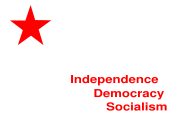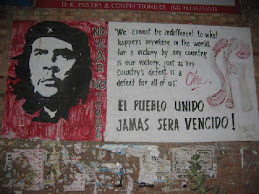We have brought out the statement of the 4 Left Parties on the Indo-US Nuclear Cooperation Agreement, which is in 3 pages (A3 size) and is dated 9th Aug, '07.
Friday, August 10, 2007
SFI-AISF pamphlet on 9th Aug, '07
9/08/07
Unite against the authoritarian administration!!
Revoke all fines on rusticated students and JNUSU President and Jt Secretary!!
Isolate and defeat the opportunist politics of AISA &DSU!!
Revoke all fines on rusticated students and JNUSU President and Jt Secretary!!
Isolate and defeat the opportunist politics of AISA &DSU!!
Friends,
The SFI AISF congratulates the student community for their spirited protest against the breach of agreement on the issue of revocation of punishments to 11 students by the administration. Yesterday’s protest march and a total strike in the university today has sent a strong signal to the administration that the student community would not tolerate such breach of faith by the administration and the completely unjustified and unethical fines imposed on the rusticated students and the JNUSU President and Jt Secy must be removed. We would appeal to the students to remain united behind the JNUSU in any future course of action decided by it. Only a rock solid unity of the student community would ensure that the JNU administration is forced to remove all these fines and implements its own agreement in letter and spirit.
The SFI AISF firmly believes that the JNUSU President and Jt Secy should not tender any kind of appeal to the administration to get their fines revoked. It is highly unfortunate that the Gen Secy of the JNUSU has given yet another appeal expressing regret to the administration in order to get his punishment revoked. As of now he is the only one among the 11 students who is not facing any kind of punishment. Unable to provide any explanation to the student community for this meek surrender in front of the administration the AISA and the DSU is accusing the JNUSU President and Jt Secy of breaking the agreement with the administration.
We would like to repeat some questions to the AISA which they have not answered so far. The AISA had accused that the JNUSU President and Jt Secy are violating the UGBM resolution by not submitting these appeals. We would like to ask the AISA that which UGBM resolution mandated the JNUSU office-bearers to tender another round of appeals to the administration. The UGBM clearly said that there should be an unconditional withdrawal of all punishments against these students. In fact it was the DSU which violated the UGBM mandate. The regret letters submitted by their suspended students after the UGBM said they regretted the inconvenience caused if any, which is a clear violation of the UGBM resolution. This is why the SFI AISF was opposed to submitting any kind of appeals to the administration when the agreement was being discussed in an all organization meeting. It was only when the rusticated students expressed their willingness to submit these appeals that we decided not to come in the resolution of this process. But as far as the JNUSU office-bearers are concerned there is no question of them giving yet another round of appeal. The agreement clearly mentions that all concerned students would be enabled to register on the basis of appeals submitted to the administration. The JNUSU office-bearers have not been denied their registration in the first place. And this is why the Gen Secretary’s act is all the more shameful where he and his organization have gone overboard in order to placate the administration.
We would also like to ask the AISA and the DSU whether or not they sincerely regret the incident which took palce on the 19th of February. Both of them had celebrated the Gherao in their pamphlets after the 19th. The AISA representatives had abstained on the resolution expressing regret moved by the SFI AISF in the council. The DSU also opposed the resolution of the council in the UGBM. In fact charges were leveled both by the AISA and the DSU that by expressing regret over what transpired on the 19th the JNUSU President and the SFI AISF had compromised with the legacy of struggles which the JNUSU has been known for. We would like to ask the AISA and the DSU that if they were so convinced about not expressing regret over the incident of 19th why did they do it at all?
This double speak is all the more interesting with the AISA. Ever since the 19th when in came to accepting within the student community that this incident was a regrettable one and was not in accordance with the democratic traditions of protest, which the JNU student movement is known for the AISA has had a lot of problems. But they did not have any problems in expressing regret in front of the administration at any point of time. Nothing else can explain their fiery revolutionary rhetorics against any kind of regret by individual students in the UGBM when all 3 suspended students form AISA including the JNUSU Gen Secretary had already submitted their individual regret letters.
Such double speak and political bankruptcy clearly reflects the degenerate and unprincipled stance of the ultra left vis-à-vis the JNU student movement in our campus. The SFI AISF and the student community no not need any lessons from them as on what constitutes the sanctity and prestige of the JNUSU. The sheer bankruptcy of their position emerges from the fact that within a span of 5 months they have arrived at a completely opposite stand on the question of regret. After 19th February it was being said that expressing regret would undermine the Sanctity of the JNUSU and now it is being argued that it the JNUSU President and Jt Secy do not give appeals they are undermining the Sanctity of the JNUSU. So much for their alternative model of the JNUSU! It is highly unfortunate that the ultra left is using the language of the administration and in a subtle manner of the right wing in the campus which has been saying that the JNUSU office bearers are the one who were the biggest culprits in the 19th February incident.
Acting in their typical petty bourgeoisie infantile style the DSU has accused the SFI AISF led JNUSU of tokenism in the name of protests. We would like to warn the DSU against such attacks on the JNU student movement which only shows their lack of understanding and commitment towards the JNUSU. We would like to make it clear to these ultra revolutionaries that movements and protests are not won on empty rhetoric but by mobilizing students against the administration. The entire campus had seen the steadfast commitment of the SFI AISF activists when they worked tirelessly during the agitation to ensure that all the unjust punishments against the 11 students were withdrawn. SFI AISF led JNUSU have had a glorious history of struggle against both authoritarian administrations as well as reactionary and right wing political attacks on the secular democratic culture of our campus. As far as tokenism is concerned we would also like to ask the DSU that why did their activists not come in the school (except a couple of them) to help the JNUSU enforce its strike in the morning. Was DSU showing only a token support for the JNUSU strike? The student community of this campus has always shown these ivory tower revolutionaries their due place in JNU and if they continue to indulge in baseless and unjustified attacks against the JNUSU then they would be given a fitting rebuff for this kind of opportunism and sectarian acts.
We also appeal to the AISA to stop spreading confusion and misinformation among the students and maintain a unity against this authoritarian administration. If their Gen Secretary does not have the spine to stand up against this administration in order to get his punishment revoked we would appeal to the AISA not to create any obstacles in this struggle. The students of this campus would not tolerate any breach of agreement by the administration or any attempt to browbeat the office of JNUSU which has been the vanguard of the student movement in this campus since the last 3 decades.
Sd/- Rajiv Kumar Ranjan, Secretary, SFI-JNU.
Sd/- Sanjay Kumar, Secretary, AISF-JNU.
Labels:
Administration,
AISA,
Bankruptcy,
DSU,
General Secretary,
UGBM
JNUSU-SIS pamphlet for Public Meeting dated 9th Aug '07
Date: 09/08/07
Friends,
It has been two years since the UPA government signed the Civilian Nuclear Agreement with the US, which has been celebrated in the foreign policy circles as something ‘historic’ in the relations between the countries. But ever since, there have innumerable rounds of negotiations by both the countries. This is precisely due to the shifting of goal posts from the side of US on many crucial points of the agreement, especially in the aftermath of the ratification in the US Congress.
The Henry Hyde Act which is a domestic law of the US that was put in place with regard to this agreement attempting to make the country kowtow the strategic interests of the US. Thus, the agreement cannot be seen in isolation as it also forms an intrinsic part of the Military Framework agreement signed with the US. These attempts by the US to make India its strategic partner also severely compromise the commitment by the UPA government for an independent Foreign Policy. This is best illustrated by the deviations in the foreign policy with India voting twice against Iran in the IAEA. The Hyde Act therefore extends beyond the nuclear realm and tries to coerce India in making her foreign policy congruent to US’ strategic interests. This would also place strong curbs on India’s own strategic programme thereby making her accept the discriminatory Fissile Material Cut-Off Treaty. More than that, by joining a US-led unequal world order, it would also relegate India’s traditional commitment to nuclear disarmament.
Overall, the agreement goes beyond the assurances given by the Prime Minister in the Parliament in 2006 and compromises on India’s own self-reliance. The US’ imperialist ambitions have already been achieved in Afghanistan and Iraq and through this agreement, there are serious attempts to get India on board. The Left and the progressive sections of the country have always unitedly struggled against any attempts by successive governments to fall in line with the imperialistic diktats of the US. Hence, it is imperative that we continue to carry forward that legacy. To discuss the details of the nuclear agreement and its wider implications for India’s foreign policy interests, JNUSU-SIS appeals to all students to attend the public meeting tonight at 9.30 pm in large numbers.
Public Meeting
INDO-US NUCLEAR DEAL AND 123 AGREEMENT: IMPLICATIONS FOR INDIA AND BEYOND
INDO-US NUCLEAR DEAL AND 123 AGREEMENT: IMPLICATIONS FOR INDIA AND BEYOND
Prabir Purkayastha, Delhi Science Forum
Siddharth Varadarajan, The Hindu
Seema Mustafa, Asian Age
09/08/07 (Tonight) - 9.30 pm - Periyar Mess
Sd/- P.K.Anand, Tiainla, C.Lalengkima – Councillors, JNUSU-SIS.
Subscribe to:
Comments (Atom)




